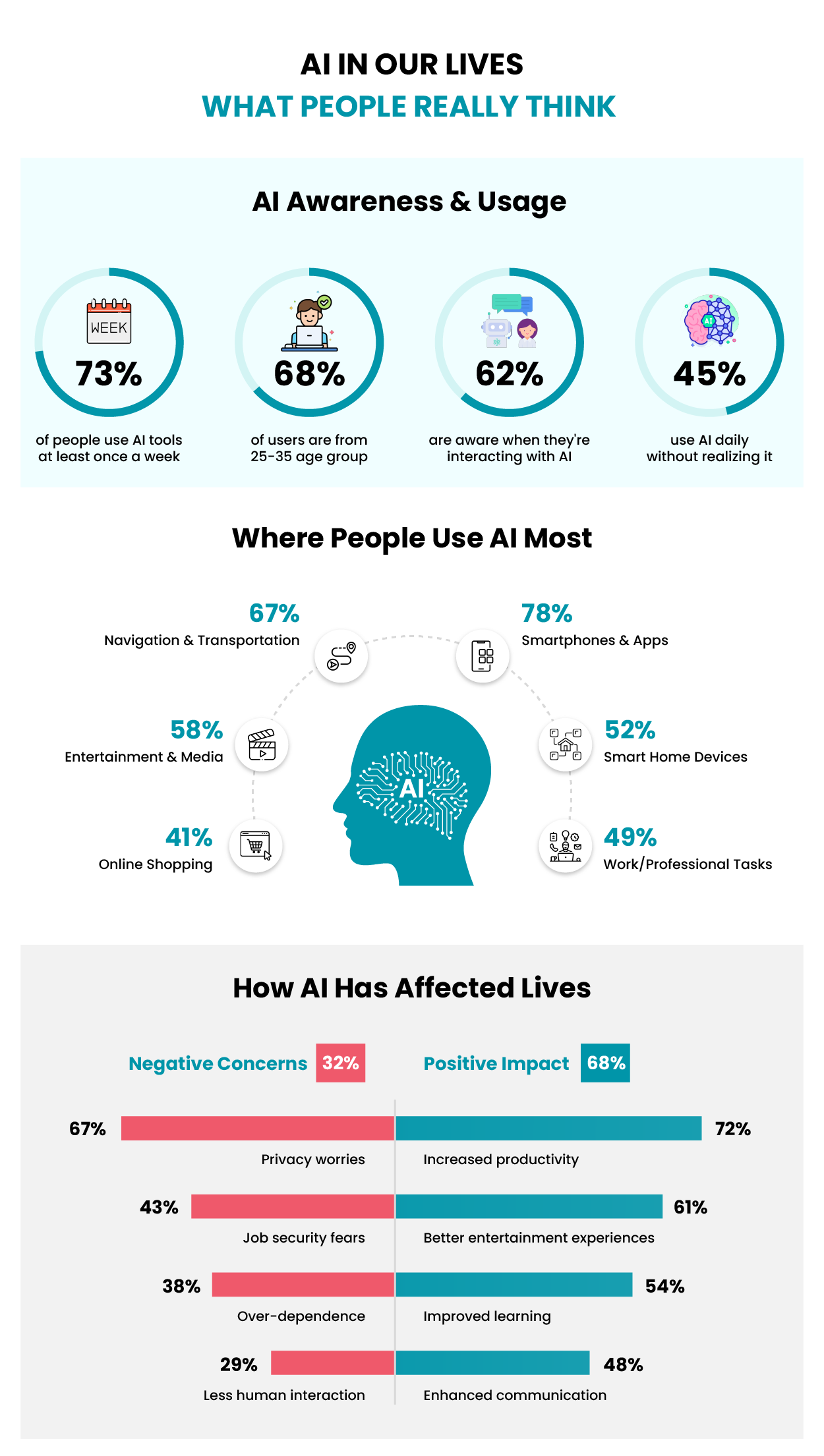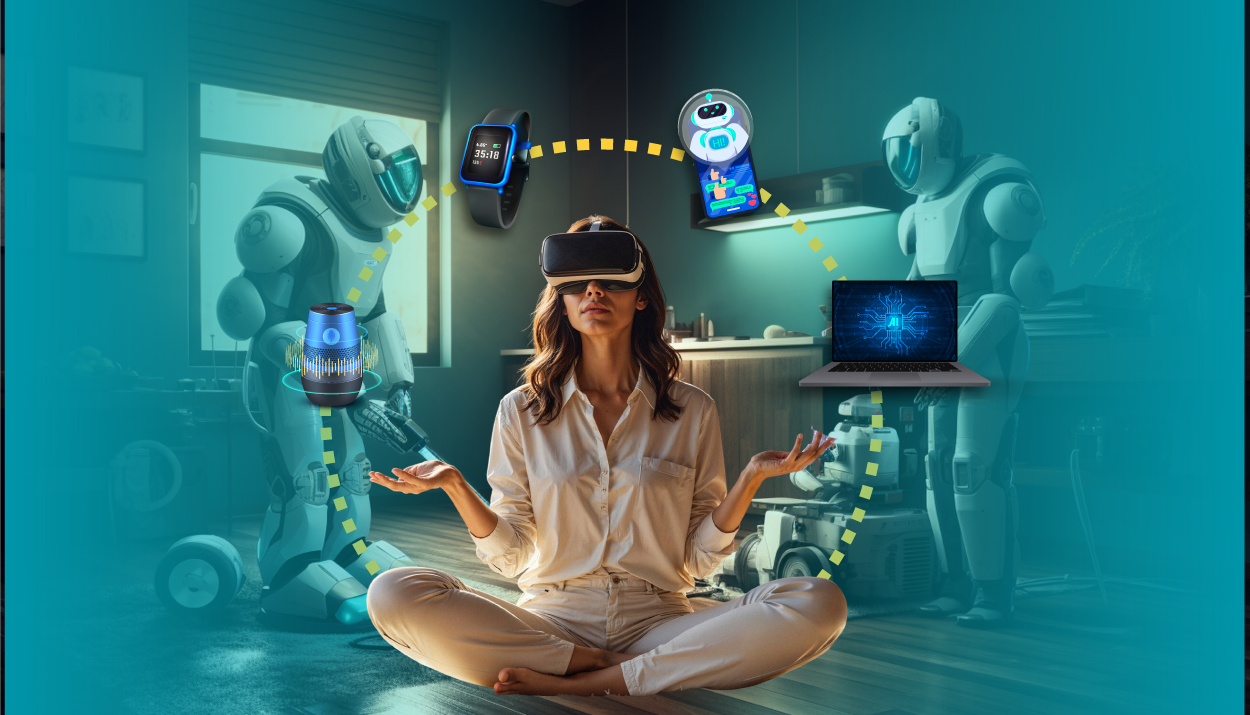Artificial intelligence has quietly woven itself into the fabric of our daily existence—often in ways we don’t even recognize. The challenge isn’t the presence of AI in everyday life; it is that we’re struggling to keep pace with how fundamentally it’s already reshaping our world. According to some bold predictions of past decades, by now, we were supposed to have computers running our homes and humanoid robots serving us breakfast. Instead, we got something far more subtle yet arguably more revolutionary. Today’s artificial intelligence whispers suggestions through our smartphones, anticipates our needs through streaming services, and makes split-second decisions in our cars’ safety systems. The future didn’t arrive with fanfare—it simply became Tuesday.
The question isn’t whether we’re ready for an AI future—we’re already living in it. The real question is whether we understand it well enough to navigate it wisely.
The Invisible Assistant – AI In Everyday Life
Artificial Intelligence has been quietly managing your life for years, making thousands of micro-decisions every day. While you sleep, it’s sorting your emails, pushing the important ones to the top and banishing spam to digital purgatory. Few examples of AI in everyday life are your morning commute, it analyzes traffic patterns across your city. When you mindlessly scroll through social media, it’s studying your every pause, like, and skip, crafting an increasingly sophisticated psychological profile to serve you content that keeps you engaged just a little longer.

Netflix suggests shows that it knows you will love. According to research, the OTT platform’s recommendation engine drives 75% of its viewership. Meanwhile, Amazon also uses AI to predict what you will buy next. These systems analyze your behavior to make life easier – but they will also keep you engaged.
Siri and Alexa are two of the most well-known voice assistants. Over 35% of U.S. households own a smart speaker. These devices handle various tasks, from setting reminders to controlling smart home devices.
Apps like Fitbit and MyFitnessPal use AI to track your activity. This allows them to suggest your workouts and detect health issues.
The scary and cool part? We often do not realize how much AI influences our choices. Let’s have a look at what our panelists across the world have to say on AI, how it has affected their lives, and how they are planning to adapt to it.

Where Artificial Intelligence is Reshaping Our Daily Lives
AI and Privacy
AI in everyday life has made personal privacy more critical than ever. Every voice command, photo upload, and search query feeds vast datasets that learn our preferences and intimate details. While this enables personalized experiences and convenient services, it raises serious concerns about surveillance, data breaches, and potential misuse by corporations and governments. The challenge lies in balancing AI’s benefits with protecting individual privacy rights in our increasingly connected world.
Over 2.5 billion people worldwide use AI-powered voice assistants, with each device potentially recording and analyzing thousands of personal conversations annually.
AI at Work
On one hand, AI tools are revolutionizing productivity by automating repetitive tasks, enhancing decision-making with data-driven insights, and creating entirely new job categories in AI development, maintenance, and oversight. On the other hand, millions of workers face displacement as AI systems become capable of performing tasks previously thought to require human intelligence, from customer service and data analysis to creative work and medical diagnosis. Success in this transition will depend on how quickly society can adapt through retraining programs, education reform, and policy changes that ensure the benefits of AI-driven productivity gains are shared broadly rather than concentrated among a few.
McKinsey estimates that AI could automate 30% of current work activities by 2030, potentially displacing 400 million jobs while creating 97 million new ones globally.
AI in Healthcare
Artificial intelligence is transforming healthcare by enabling earlier disease detection, personalized treatment plans, and more accurate diagnoses than ever before. AI algorithms can analyze medical images to spot cancers that human radiologists might miss, predict patient deterioration hours before symptoms appear, and help doctors choose optimal treatment protocols based on vast databases of similar cases. However, this technological revolution raises important questions about the role of human empathy, intuition, and the doctor-patient relationship in healing.
AI diagnostic tools have demonstrated accuracy rates exceeding 95% in detecting certain cancers from medical imaging, compared to 87% accuracy for human specialists.
AI and Education
The education sector is experiencing a fundamental shift as AI-powered platforms promise to deliver personalized learning experiences tailored to each student’s pace, learning style, and knowledge gaps. But the concerns arise about screen time, reduced human interaction, and the potential for AI systems to perpetuate biases in educational content and assessment.
Students using AI-powered tutoring systems show learning gains that are 2.5 times greater than traditional classroom instruction alone, but only 35% of schools worldwide have adequate technology infrastructure to implement such systems.
AI and Social Media
Social media platforms powered by sophisticated AI algorithms have fundamentally altered how we communicate, consume information, and perceive the world around us. However, the same algorithms that curate our feeds also create echo chambers, amplify misinformation, and can manipulate emotions and behaviors for commercial or political gain. The psychological impact of AI-driven social media includes increased rates of anxiety and depression, particularly among young users, while also raising concerns about democratic discourse and the spread of conspiracy theories.
The average person spends 2.5 hours daily on AI-curated social media feeds, with algorithms determining 98% of the content they see based on engagement prediction models.
Your Turn: Shape the AI Revolution
Tech companies rely on consumer feedback to improve AI. Have you ever noticed YouTube asking, “Was this video helpful?” That insight is data training the AI to serve you better content. But there is a catch! If the data it learns from is limited, the AI will be too. This is called the ‘Bias Problem.’
For instance, have you ever heard of facial recognition systems struggling to identify people with darker skin tones? Or voice assistants misunderstanding accents? That happens when AI is trained mostly on data from one group of people.
The Fix? This is where you can help. Companies do not just want data. They need your unique perspective to build AI that works for real people.
Here is where survey platforms like The Panel Station can help you. You can share your opinions through quick and fun surveys on our platform. This will help fix biases and shape ethical tech. Companies will get real-world information and not just guesses.










